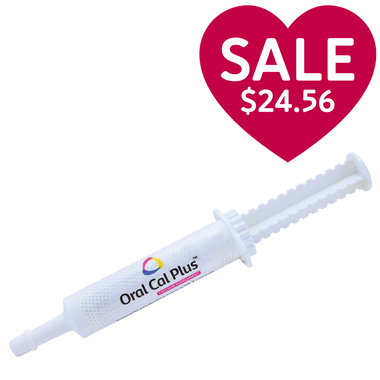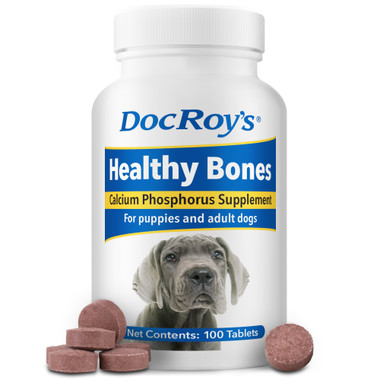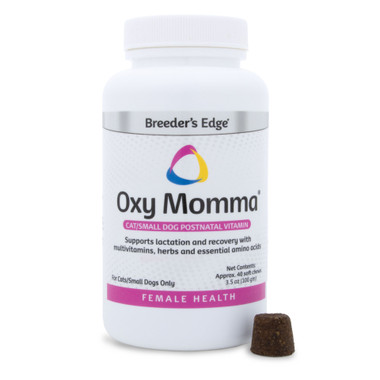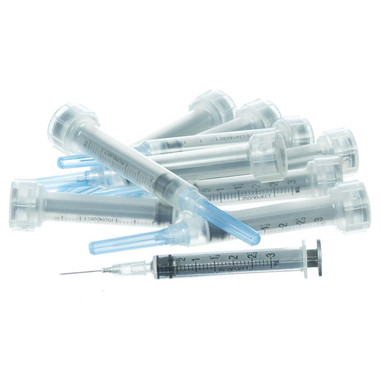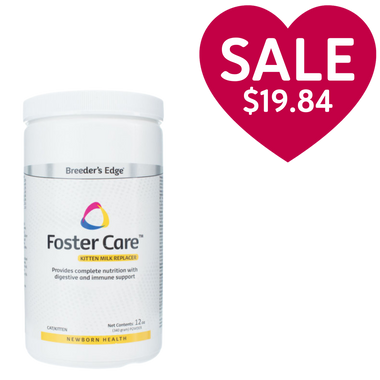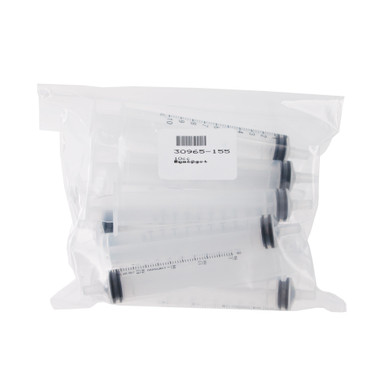Why Vitamin E is Important for Horses
Estimated 0 min read
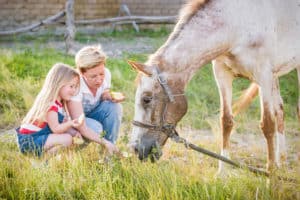 One of the most crucial parts of caring for your horse is to ensure that they’re getting all of the proper nutrients, vitamins, and minerals. Heck, that’s one of the most crucial parts of caring foryourself.
One of the most crucial parts of caring for your horse is to ensure that they’re getting all of the proper nutrients, vitamins, and minerals. Heck, that’s one of the most crucial parts of caring foryourself.
But do you ever stop to ask why we do that? More specifically, have you ever wondered why all of the different vitamins are so essential to ingest? Vitamin A, Vitamin C, Vitamin E, Vitamin H…
See?! There’re so many different vitamins to consider. You probably had to stop and think about whether or not Vitamin H was real! (you’re in luck…It’s not!).
Well, starting with this blog, we’re going to lift the veil on why all of the different vitamins are essential for your horse’s health – starting with Vitamin E.
Facts About Vitamin E
- Vitamin E provides immune system support, neuromuscular support, and cell function support. All are critical for a happy, healthy horse
- A lack of Vitamin E can lead to a number of severe, mostly untreatable diseases. These can affect your horse’s muscular and neurological health
- The best prevention for Vitamin E deficiency in horses is to provide a proper amount in their diet. When supplementing, use natural Vitamin E supplements. Horses’ livers absorbed them better.
Why is Vitamin E important for your hooved friend?
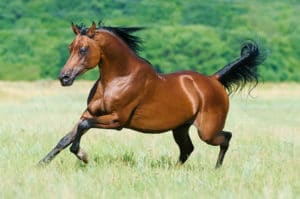
Vitamin E can benefit muscles.
Let’s get one thing straight: Vitamin E is kind of a misleading name for what we’re actually talking about. In reality, it is kind of a catch-all term to describe eight structural variants of two naturally occurring compounds. The two compounds that comprise what we know of as “Vitamin E” are tocopherols and tocotrienols, each of which have four variants: alpha, beta, gamma, and delta. Alpha-tocopherol is the most abundant and naturally available variant compound for horses.
Take note of that last sentence. Horses need Vitamin E in their diet. It is one of only two necessary vitamins that horses cannot produce themselves.
Vitamin E is important because of the multiple health benefits it provides your horse. Some of the health benefits are its immune-boosting abilities and its ability to support healthy nerve and muscle function. Vitamin E is able to provide these benefits due to its ability to limit oxidative stress within horses’ bodies.
Free radical cause oxidative stress. This unstable molecule siphons electrons away from other molecules – like DNA and cell membranes – to become stable. This thieving of electrons causes those healthy molecules to become unstable which can cause increased muscle soreness, slow recovery from injury, and increased frequency of illness.
As an antioxidant, however, Vitamin E works in tandem with other vitamins like Vitamin C and minerals like selenium to neutralize free radicals before they cause damage. To summarize, Vitamin E is important for horses because it helps defend against free radical damage.
What are the risks of Vitamin E deficiency in horses?
An unchecked dietary deficiency in horses can contribute to the development of three distinct diseases: equine neuroaxonal dystrophy/equine degenerative myeloencephalopathy (eNAD/EDM); equine motor neuron disease (EMND); Vitamin E Deficient Myopathy (VEM). Initiall, an equine physician will need to rule out other disorders. Then they will evaluate concentrations of Vitamin E in your horse’s blood to diagnose any of these diseases.
eNAD in Horses
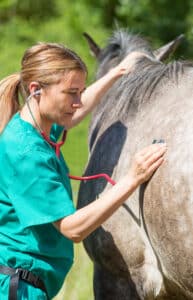
Equine physician checking vitamin deficiency.
eNAD/EDM is a disease that often presents in young horses. Affected horses may display odd posture by standing with their limbs too close together or far apart and may display a lack of coordination. Unfortunately, it appears that some horses have a genetic predisposition to developing eNAD/EDM. Even more worrisome is that not every horse afflicted with eNAD/EDM displays the same symptoms. Some horses with it display great discomfort and are nearly debilitated by the disease, while other horses are only mildly inconvenienced by it.
EMND in Horses
Unlike eNAD/EDM, equine motor neuron disease primarily strikes in older horses that have a history of Vitamin E deficiency. EMND degrades the neurons in horses’ brains that supply direct neurological input to their muscles. As a result, horses who suffer with EMND will see their muscles atrophy over time leading to weakness and weight loss. Horses affected carrying their heads very low to the ground and will lie down for longer periods of time. Unfortunately, the majority of horses who develop EMND do not respond well to treatment, with over 60% either remaining in the same condition or getting worse after Vitamin E has been supplemented in their diet.
VEM in Horses
And, unlike both eNAD/EDM or EMND, Vitamin E Deficient Myopathy is found in horses of all ages who have only been deficient in Vitamin E for a short time. Horses with VEM tend to exhibit muscle weakness and energy levels due to the alterations that occur to their cells’ ability to store energy. Luckily, horses with VEM tend to recover from the disease relatively quickly with proper supplementation.
Treating Diseases Related to Vitamin E Deficiency in Horses
What is particularly unfortunate about these diseases is that none of them have effective treatments that are specific to them. VEM is by far the least destructive of the mentioned diseases and it’s the most responsive to supplementation, but it doesn’t have its own treatment. Horse owners need to provide adequate amounts of Vitamin E is the best protection against diseases caused by Vitamin E deficiency.
How much Vitamin E do horses need?

Daily Vitamin E intake can vary for horses.
According to The National Research Council (NRC),horses need a minimum of 1 – 2 IU of Vitamin E per kilogram of bodyweight to maintain optimal health. For a 400kg horse, this means they should have between 400 and 800 IU of Vitamin E per day.
The recommended amount of Vitamin E per day for horses changes dramatically when referring to working horses and pregnant or lactating broodmares. For these horses, the NRC recommends no less than 1,000 IU per day. Additionally, the NRC recommends that weanling or yearling horses get no less than 500 IU of Vitamin E per day.
Also, remember that the body condition of your horse will also determine how much Vitamin E your horse needs each day. For example, slim horses that have less fat tissue need more Vitamin E than muscular or chunky horses do. This is because horses with less fat tissue have less room to store Vitamin E. Additionally, horses who are ill, suffering from allergies, or who have metabolic syndrome should have increased Vitamin E intake.
It’s important to note that numbers only reflect theminimumamount of Vitamin E for horses to avoid deficiency. In reality, horses need much more Vitamin E than 1 – 2 IU each day to maintain optimal health.
What are the sources of Vitamin E for horses?

Vitamin E is found abundantly in lush pastures
Luckily for most horse owners, Vitamin E is found abundantly in lush pastures. Good-quality, green grass offers an excellent source of Vitamin E in all of its natural forms. Horses who sustain themselves on grass pastures will consume significantly more Vitamin E than the minimum requirements.
Unfortunately, because Vitamin E is not heat-stable, its concentration in grasses decreases as the temperature of the environment increases. Horses who live on poorly maintained pastures or in arid climates need it in the form of hay. Horses who subsist entirely on hay will also need additional Vitamin E in their diet to maintain proper health. Horse owners who want to minimize the amount of Vitamin E lost due to sunlight and warm temperatures should cut their hay early and store it in a dry, dark place.
However, if you’re like most equine owners, you probably have heard about supplementing your horse’s diet with added Vitamin E. While we can attest that Vitamin E supplements can benefit horses, we do not recommend you go and buy some right now. Only give Vitamin E supplements to your horse at the recommendation of your veterinarian. Additionally, it’s important that you understand the differences between the two types of Vitamin E supplements: natural and synthetic.
Differences between natural and synthetic Vitamin E
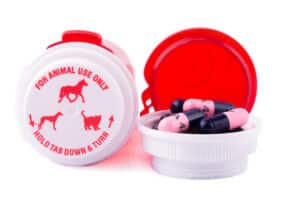
Natural VS Synthetic Vitamin E
There are two distinct differences between natural and synthetic Vitamin E. The first has to do with labeling. Synthetic Vitamin E is labeled “dl” in front of the compound name. An example of a synthetic Vitamin E compound is “dl-alpha-tocopherol”. Compare this to a naturally-occurring Vitamin E compound, which will be listed with only the letter “d” beside its compound name. An example of a natural Vitamin E compound is “d-alpha-tocopherol”.
The other important difference between natural and synthetic Vitamin E has to do with how it’s absorbed by a horse’s body. According toa study produced by Kentucky Equine Research, horse’s livers have specific transport proteins that bind better to natural Vitamin E than to synthetic forms. Vitamin E to be transported to other tissues where it supports cell function. Synthetic Vitamin E, on the other hand, was observed to be excreted faster than the natural form. This means that horses taking synthetic Vitamin E supplements had to ingest more to achieve the same Vitamin E blood concentration as horses taking natural supplements.
Regardless of whether you choose to administer natural or synthetic Vitamin E supplements to your horse, it’s important to conduct regular follow-ups with your equine veterinarian. Follow-ups entail a blood serum test to evaluate whether or not the supplements are effective at raising the concentrations of Vitamin E in your horse’s blood.
Can horses have too much Vitamin E?
Although unlikely, horses can have too much Vitamin E. Ingesting too much Vitamin E is dangerous for horses because it interferes with the absorption of Vitamin A. Too much can affect the absorption and processing of other vital nutrients, minerals, and vitamins depending on your horse’s diet.
This is the reason that it is critical you consult your equine nutritionist before you administer any Vitamin E supplements. An equine nutritionist will be able to review your horse’s current diet. They will alert you to potential complications the supplement causes.
Final Say on Vitamin E
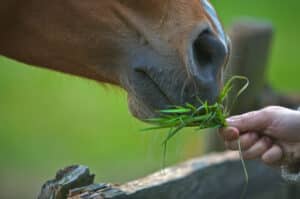
Daily dose of Vitamin E – green grass.
Vitamin E is important because it supports horse’s immune system. It also bolsters their neuromuscular health.
You should also know that horses can get their daily dose of Vitamin E through green grass. Horses can also get adequate Vitamin E through supplements. However, natural Vitamin E supplements are absorbed better than synthetic Vitamin E supplements.
Finally, it’s important to consult with your equine veterinarian and nutritionist before supplementing your horse’s diet. Ensure your horse gets the maximum benefits from their supplement program so they don’t ingest too much.
However, you know what you can never ingest too much of? Knowledge. That’s why we hope you’ll keep coming back to read more about how to care for horses here onour blog!Or for another important and serious topic, Can Ifeed my horse lawn mover clippings?







